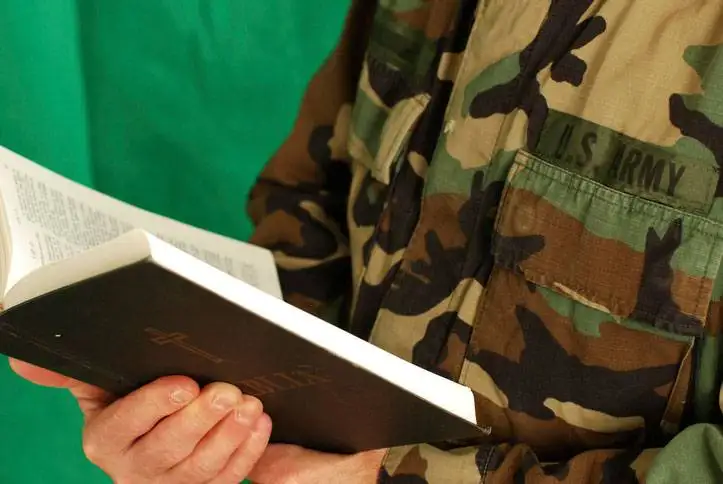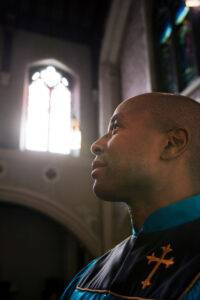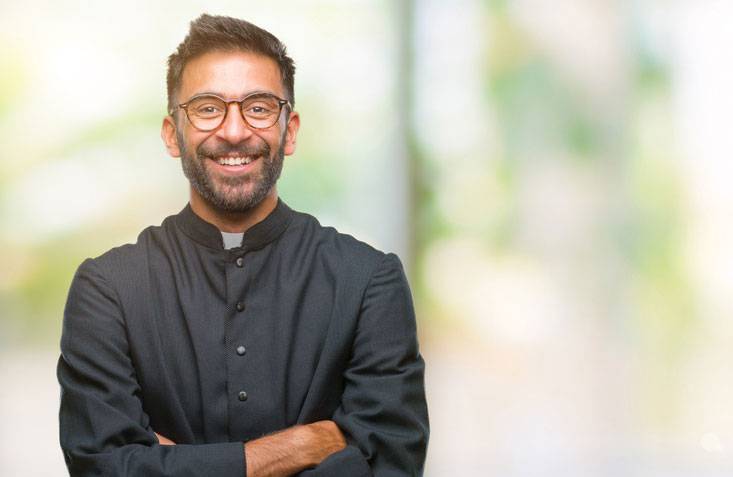
The appearance of U.S. Department of Defense (DoD) visual information does not imply or constitute DoD endorsement.
Service in the ministry is not a job like other jobs. You don’t take a career aptitude test in high school and find “priest” as one of your top five jobs. You won’t find a church booth at a career fair enticing you to do the Lord’s work after graduation.
This is a role that you are called to by a higher power. And it’s as much a way of life as a job.
But like other jobs, it is one that requires training and education to perform properly. There are rules about becoming a minister and different types of pastoral positions within religious organizations. Although it’s a working world outside the view of most people, it has many different specializations and types of qualifications to enter them.
And like many other jobs, there are paths to service in the ministry and theological study through service in the American military.
Explore Your Military Training and Degree Options
Faith in the Chaplain Corps Means Showing Courage in and Out of the Ranks
 Chaplain Charlie Liteky, a Roman Catholic priest assigned to the Headquarters Company of the 199th Infantry Brigade, had been on patrols with the troops before. It was good for morale, and it helped him understand what the men he served were experiencing.
Chaplain Charlie Liteky, a Roman Catholic priest assigned to the Headquarters Company of the 199th Infantry Brigade, had been on patrols with the troops before. It was good for morale, and it helped him understand what the men he served were experiencing.
But none of them had experienced anything like what hit Company A of the 4th Battalion when he was on a mission with them on December 6th, 1967. Patrolling near Phuoc-Lac in South Vietnam, the unit was ambushed by a battalion-sized enemy force with such violence that everyone hugged the ground in shock at first.
But Liteky saw two wounded men nearby, both threatened further by enemy machine gun fire. And he was moved to help them.
Crawling to within 15 meters of the enemy gun, he placed himself between the wounded men and the line of fire. Dragging them to the LZ, he then returned to the fray, administering last rites, and assisting others in evacuating. Seeing another man trapped, Liteky crawled to retrieve him and realized he was too heavy. Liteky rolled onto his back, placed the man on his chest, and pushed himself back to the LZ inch by inch.
When it was over, despite suffering wounds himself, Liteky was found to have personally retrieved 20 men for evacuation.
The next year, he became one of only eight Army chaplains to have ever been awarded the Medal of Honor.
But Liteky’s courage and faith didn’t stop there. After the war, he became a noted peace activist. He worked as a counselor at the VA with other returning vets. Eventually, he renounced his Medal of Honor and the stipend that went with it and committed himself to preventing further wars… determined that no one else should have to make the sacrifices he saw in battle.
Work in the Ministry Fulfills Human Needs in Society and in the Service
 Ministers are focused on seeing the best in each of us, and guiding us toward further perfection. That’s true in or out of the military. The word minister is Latin, and means servant or attendant. That’s an accurate description of the job still today—as members of the military serve in defense of their country, ministers serve in defense of our mortal souls.
Ministers are focused on seeing the best in each of us, and guiding us toward further perfection. That’s true in or out of the military. The word minister is Latin, and means servant or attendant. That’s an accurate description of the job still today—as members of the military serve in defense of their country, ministers serve in defense of our mortal souls.
As a practical matter, this takes place in a wide variety of different roles, both with churches and in non-profit organizations—or, as you’ll see, in government service.
Ministers typically:
- Tend to the needs of the disabled or disadvantaged
- Offer care and solace to those suffering loss or trauma
- Provide guidance in living a more moral or religious life, including making major life choices
- Lead parishioners in religious services and worship ceremonies appropriate to their religion
- Assist with obtaining other services as needed to ease suffering and tend to the weak
Every religion sets its own standards for who may or may not join the ministry. In most cases, it requires membership in the church and approval of elders or other clergy. Educational requirements are standard, sometimes in very specific types of schools with approved doctrinal teachings.
But theology degrees don’t always or necessarily lead to the ministry. It’s even possible to earn degrees in theology as a purely academic matter, studying the practices and beliefs of one or more religions as a scholarly interest. Though less common, it’s possible to find theologians who are non-believers, who work as professors or as advisors in government or corporate jobs.
Within churches themselves, there are many different specializations and types of position you can qualify for with a degree in ministry or theology:
- Administration
- Outreach and missionary services
- Education
- Music
- Media
- Counseling
Basically, there are a wide range of different kinds of different roles you can fill with a degree in ministry or theology. Only you will know which of those jobs you are being called to.
Wealth in the Ministry Doesn’t Rise From the Paychecks
 Clearly, money is not the major focus for anyone who is called to the ministry. But you do need to be sure that you will have enough income to support yourself and your family, assuming your order allows marriage.
Clearly, money is not the major focus for anyone who is called to the ministry. But you do need to be sure that you will have enough income to support yourself and your family, assuming your order allows marriage.
It’s also the case that the many different jobs available in ministry have a wide range of salaries. A pastor for a small rural church may be paid a fairly basic stipend, while a big-city megachurch pastor could earn above-average wages for their area.
For 2021, the Bureau of Labor Statistics found that the average salary for clergy in the United States was $57,230 per year. Those in the top ten percent earned more than $80,920 annually.
Working in support roles in religious schools or as assistants in larger churches, directors of religious activities or education earned an average of $52,880 per year.
It’s also worth remembering that many churches provide housing and other supportive measures for pastors, so although wages are not high, often expenses aren’t either.
Military Chaplains Boost Morale and Care for Physical and Spiritual Needs
There are no atheists in foxholes, or so the saying goes, and so the American military has made official provision for overseeing the spiritual well-being of its troops from the beginning.
The Reverend John Hurt, a veteran of the Continental Army from Virginia, was appointed as the first Congressionally-approved chaplain to the Army on March 4, 1791.
As was the case then, chaplains have to show up for service already fully ordained. The military does not set the conditions for ordination, leaving those up to the faith of the minister. But since most denominations require that ordained pastors hold a Master of Divinity degree, the larger part of the education of a chaplain will be in the rear-view mirror before they ever join up.
Dedicated Roles for Chaplains and Assistants Offer Opportunities at the Commissioned and Enlisted Levels
 Only the Army, Navy, and Air Force have serving chaplains. Both the Marine Corps and Coast Guard count on the Navy for chaplains, while Space Force counts on the Air Force.
Only the Army, Navy, and Air Force have serving chaplains. Both the Marine Corps and Coast Guard count on the Navy for chaplains, while Space Force counts on the Air Force.
Although all chaplains are officers, they are also non-combatants. Instead of attending regular Officer Candidate School (OCS) or Reserve Officer Training Corps (ROTC) commissioning program, they go through a specialized and abbreviated Direct Commission Officer (DCO) training program. The Army, in fact, has a specific DCO course for chaplains, the Chaplain Basic Officer Leader Course.
However, it is also possible to join ROTC and apply for an educational delay to defer service while attending graduate school toward your divinity degree. This can cover up to four years of costs for your undergraduate degree in return for an eight-year service obligation. But the delay is not a guarantee, so you can end up sworn into another MOS.
Chaplains don’t do their work alone. Branches that commission chaplains also assign them enlisted assistants. While there are no specific requirements for belief or qualification for these roles, they do offer a path to future studies in ministry after discharge from the service.
There are options for getting part of your college training in ministry and theology covered whether you choose to pursue it before joining as a full-fledged chaplain, or after your service as an enlisted chaplain’s assistant.
Military Benefits that Let You Earn a Degree in Ministry or Theology Before Serving
Although ROTC itself isn’t a good option for most individuals who plan to enter the service as a chaplain, all three branches that commission clergy coordinate a sort of special chaplain-specific kind of ROTC program: the Chaplain Candidate Program (CCP).
You may be able to access both ROTC and CCP benefits through the educational delay process that allows you to attend seminary directly after earning your ROTC-sponsored bachelor’s degree.
These programs connect you with the military while you are still in seminary finishing up your divinity degree. Initially, chaplains commissioned through these programs are assigned as officers in the Reserves, although they may then be eligible for reappointment to active duty.
Although those for the Air Force and Navy do not cover any of your tuition or other costs of attendance, they do commission you while you are still going to school—and that comes with all the typical pay and allowances for officers. So, in effect, you will be getting so money to support you while you study.
Your status as an officer opens up additional benefits that are available to reservists as well, such as Military Tuition Assistance (MTA). Covering up to $4,500 per year and up to $250 per credit hour, this can provide a valuable boost to your education.
The Army’s CHCP program does offer coverage of up to 100 percent of your tuition while you are earning your master’s in divinity.
Like ROTC, CCP comes with activities during the summers that focus on specific military training and give you a taste of what being a chaplain in different types of units is like. Additionally, you’ll have practicum placements with your service of choice that also fulfill degree requirements.
Since those degrees are, by definition, graduate degrees, you still will need to come up with a way to earn an undergraduate degree first. But once you are in the service, you may be able to take advantage of programs like the Student Loan Repayment Program (SLRP), which can take over any outstanding loans up to a specific amount. SLRP is an incentive, not a benefit, so you’ll have to be sure to negotiate it with your recruiter.
Training Doesn’t Stop After Your Initial Education in Military Religious Affairs
 Chaplains can come from any faith or creed, which means the military largely stays hands-off in any kind of religion-specific training or continuing education. But that doesn’t mean that further training is off the table entirely—unit chaplains are expected to work in difficult circumstances and offer support to all troops. Training in counseling, handling emotional or family difficulties, and specific procedures for dealing with the dead or wounded is available.
Chaplains can come from any faith or creed, which means the military largely stays hands-off in any kind of religion-specific training or continuing education. But that doesn’t mean that further training is off the table entirely—unit chaplains are expected to work in difficult circumstances and offer support to all troops. Training in counseling, handling emotional or family difficulties, and specific procedures for dealing with the dead or wounded is available.
Navy chaplains are sent on to seven weeks of additional training at the Naval Chaplaincy School and Center in Newport, Rhode Island, after commissioning.
The same is true of enlisted ranks assigned to assist chaplains. Each has their own training pathway that includes the basics of counseling and bereavement, ethics, and paperwork and administrative requirements.
How To Become a Minister and Earn a Degree in the Field After Serving
 If earning both a bachelor’s degree and a Master of Divinity is too steep a hill to climb before you join up, you will be on the enlisted chaplain’s assistant track to degrees in theology and ministry.
If earning both a bachelor’s degree and a Master of Divinity is too steep a hill to climb before you join up, you will be on the enlisted chaplain’s assistant track to degrees in theology and ministry.
Just as any other service member, you are eligible for the MTA program, which can allow you to start your studies while you are still on active duty. MTA doesn’t offer enough of a kick to get you all the way to a bachelor’s degree, but you can squeeze in a two-year associate program, which can often be used to transfer to a four-year school with the first half of your bachelor’s already taken care of.
Most of your options will come after you are discharged, however. American military veterans benefits cover up to 36 months of college training through the GI® Bill program. All you have to do next is find a school where you can use it!
Finding Military-Supportive Colleges Offering Degrees in Ministry and Theology
In some ways, looking for a school to pursue a degree in ministry or theology at is simpler than other kinds of degrees. As part of the terms of ordination for your faith, you will be choosing from among a small set of schools that teach the right doctrine to prepare you for religious orders.
But this also becomes a challenge when you have to combine it with finding a school that is military-supportive. After all, many of the kinds of religious schools that turn out divinity students don’t have a big veteran student population!
This means it will be more important than ever for you to do your homework. You’ll be looking for schools that:
- Accept GI Bill® benefits
- Offer special tuition rates and admissions policies for veterans
- Have dedicated academic counseling for former military members
- Host veterans support groups and have other veteran students in attendance
The VA’s GI Bill® Comparison tool, available on their website, is an easy way to track down this information. Searching by location or by school, it will break down the benefits available and let you identify the best options with one-stop-shopping.
Yellow Ribbon Program Participation May Be the Most Military-Supportive Feature To Look For
The Yellow Ribbon program has a special place for students pursuing divinity or theology degrees. Although there are many divinity schools that accept GI Bill® benefits, all are private religious universities. And GI Bill® benefits are capped at a level that is often exceeded by private school tuition.
Yellow Ribbon is the number one way that schools and the VA help vets get around that problem. Every participating school decides on a level of funding to contribute to cover tuition over the limit; the VA then matches that amount. In most cases, it’s enough to make up the difference, and send you to elite divinity programs for no extra costs.
Schools also have the option to set a limit on the number of students accepted into Yellow Ribbon each year, so it can be competitive. But truly military-supportive schools will take all those who otherwise qualify for admission.
Ministry and Theology Degrees Build Both Faith and Expertise
 You’ll quickly find that degree programs in ministry and theology have some substantial differences from other college degrees. Since most are at religious schools, daily prayer and other worship activities are considered part of the program. You’ll have far greater personal obligations to develop your relationship with your deity in and outside of class. And your community, volunteering with local churches or religious groups, will probably feature prominently even when it’s not a part of the curriculum.
You’ll quickly find that degree programs in ministry and theology have some substantial differences from other college degrees. Since most are at religious schools, daily prayer and other worship activities are considered part of the program. You’ll have far greater personal obligations to develop your relationship with your deity in and outside of class. And your community, volunteering with local churches or religious groups, will probably feature prominently even when it’s not a part of the curriculum.
The Training You Get in Ministry and Theology Programs Can Help Prepare You for Service in Any Role
The curriculum you find in either a theology or ministry degree program are fairly consistent. Different levels of study will explore theological and the practical aspects of ministry at greater or lesser depth. But regardless of religion, chaplains need a similar breadth of knowledge and skills to succeed in or out of the military. And they get it through coursework like:
Spiritual formation – These intensely personal courses help cultivate your personal relationship with your deity and build your sense of compassion, ethics, and morality in line with the teachings of your religion.
Scriptural studies – Most major religions have foundational documents or stories they rely on heavily for guidance. Being a successful religious leader means developing familiarity with not just the text of these, but also an ability to interpret them for guidance in various situations. Hermeneutics, as this is often called, may happen in English or in the original language of the scripture.
Liturgy and worship – Understanding and knowing how to conduct the ceremonies and celebrations of your religion are key parts of pastoral leadership.
Theology and comparative religion – Religion offers a path to interpreting and exploring the great spiritual questions of life. It’s a kind of philosophy, and the existence of multiple religions means there is not a single approach. Most ministry programs have focused courses in comparing your religion to others, studying both similarities and differences to give you a better understanding of your own faith—and a respect for that of others. This is particularly important for military chaplains, who are expected to serve all members of their units, even those with different beliefs.
Pastoral counseling – Finally, in their role as comforters, students of the priesthood receive training in how to deal with the lost, bereaved, and traumatized. Using a combination of modern psychological understanding with time-tested truths drawn from scripture, this is an important part of studies for chaplains.
What Level of Degree Should You Pursue in Ministry or Theology?
As with other fields, there are a range of different degree levels at which you can study ministry or theology.
Associate Degrees in Ministry or Theology
A two-year degree in ministry or theology offers some basic foundations in theological thought and deepening your relationship with your faith. You’ll pick up the essential aspects of your church’s foundational documents, learn the history of your faith, and explore the rituals and observances conducted by ministers. These degrees are most often a stepping-stone to a baccalaureate degree and are not qualification for ministry jobs in themselves.
Bachelor’s Degrees in Ministry or Theology
The four-year course of study in a bachelor’s program opens up far more opportunities and delivers far more information and training than an associate. These degrees are a requirement for enrolling in master’s-level programs, so they are a sure stop on your path to ordination. They add to your scriptural knowledge while also offering more coursework in pastoral counseling and worship leadership. A bachelor’s program also comes with solid grounding in the liberal arts, which teaches you problem-solving, better communication skills, and more historical and social sciences perspective with which to inform your practice.

Master’s Degrees in Ministry or Theology
The master’s degree level, and specifically the Master of Divinity, is considered the standard educational requirement for pastors and ministers in most American denominations. They are intensive programs that can take from two to three years to complete. Your course of study at this level will be given over completely to religious studies. In many cases, you’ll be required to study the original languages of your belief’s scriptures, and to study those documents in the original tongue. You’ll also get more practical instruction and internship or practicum placements in pastoral roles, leading liturgy and offering counsel to parishioners.
Doctoral Degrees in Ministry or Theology
A doctoral program will take an additional three or four years of study. They typically focus on some particular aspect of ministry or theology—a particular area of practice like worship ministry, or a field of knowledge in specific scriptural studies. Doctoral studies can take you into advanced areas of religious theory and analysis, suitable for academic work, or inform priests at the highest levels of religious hierarchy in interpretation and guidance of their church.
Faith will get you a long way in a career in ministry and theology, but there is a lot more than that you can take from your military service that will make you a better pastor. In fact, the word service might say it all… you will have already learned all the important characteristics of:
- Loyalty
- Self-sacrifice
- Initiative
- Diligence
Those are traits that everyone wants to see in faith leadership.
2021 US Bureau of Labor Statistics salary and employment figures for Clergy and Directors, Religious Activities and Education reflect national data, not school-specific information. Conditions in your area may vary. Data accessed June 2022.





